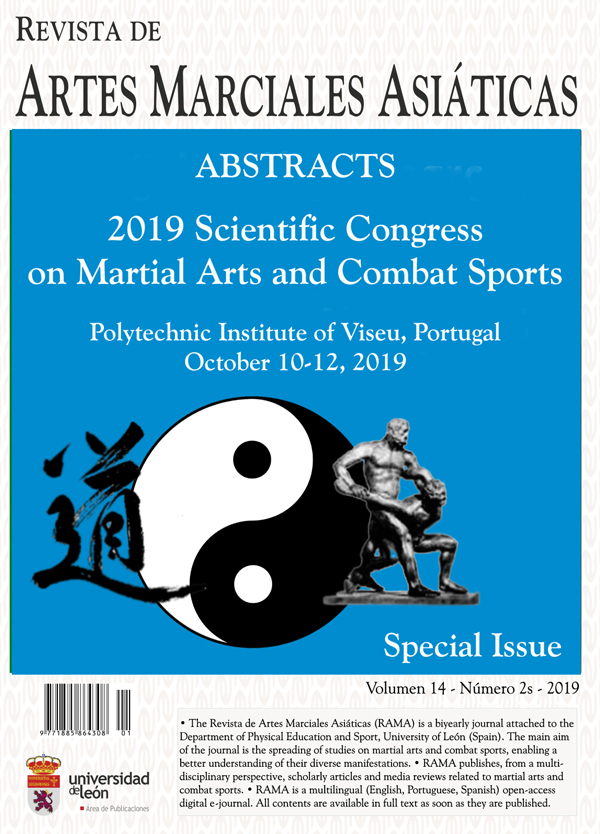Motivation and martial arts and combat sports participation: a study protocol
DOI:
https://doi.org/10.18002/rama.v14i2s.6011Palavras-chave:
Martial arts, combat sports, self-determination theory, motivation, physical activity adherence and retention, mediation analysisResumo
Martial arts and combat sports (MA&CS) popularity has been growing, and their associated benefits are widely known. Several studies report psychological benefits related to MA&CS participation. Albeit there is a broad body of research (following the tenets of self-determination theory - SDT) on motivation in sport and exercise, research in MA&CS motivation is scarce or very specific to single disciplines or styles. The objective of this study is to understand the motivational mechanisms for adherence and retention on MA&C practice, to identify differences between MA&CS on participants’ basic psychological needs and the quality of their motivational regulation. Mediation analysis will be conducted to explore the mechanisms of motivation on MA&CS participation.
Downloads
Métricas alternativas
Referências
Chyu, M. C., Zhang, Y., Brismée, J. M., Dagda, R. Y., Chaung, E., Von Bergen, V., … Shen, C. L. (2013). Effects of martial arts exercise on body composition, serum biomarkers and quality of life in overweight/obese premenopausal women: a pilot study. Clinical medicine insights. Women's health, 6, 55–65. doi: https://dx.doi.org/10.4137/CMWH.S11997
Chyu, M.-C. (2010). A non-competitive martial arts exercise program for health and fitness in the general population. Journal of Human Sport and Exercise, 5(3), 430-443. doi: https://doi.org/10.4100/jhse.2010.53.13
Fabio, R. A., & Towey, G. E. (2018). Cognitive and personality factors in the regular practice of martial arts. Journal of sport medicine and physical fitness, 58(6), 933-943. doi: https://doi.org/10.23736/S0022-4707.17.07245-0
Hayes, A. F. (2013). Introduction to mediation, moderation, and conditional process analysis: A regression-based approach. New York: The Guilford Press.
Jansen P. & Dahmen-Zimmer, K. (3 de 2012). Effects of cognitive, motor, and karate training on cognitive functioning and emotional well-being of elderly people. Frontiers In Psychology, p. 40.
Körner, S., Heil, V., & Staller, M. S. (2017). Motive in der Selbstverteidigung: Eine qualitative und quantitative Studie am Beispiel Krav Maga und Wing Chun. In S. Körner, & L. Istas (Eds.), Martial Arts and Society: Zur gesellschaftlichen Bedeutung von Kampfkunst, Kampfsport und Selbstverteidigung (pp. 146-159). Feldhaus, Edition Czwalina.
Koutures, C., & Demorest, R. (2018). Participation and Injury in Martial Arts. Current Sports Medicine Reports, 17(12), 433-438. doi: https://doi.org/10.1249/JSR.0000000000000539
Bounty, P. L., Campbell, B. I., Galvan, E., Cooke, M., & Antonio, J. (2011). Strength and Conditioning Considerations for Mixed Martial Arts. Strength & Conditioning Journal, 33(1), 56-67. doi: https://doi.org/10.1519/SSC.0b013e3182044304
Lip, R. W., Fong, S. S., Ng, S. S., Liu, K. P., & Guo, X. (2015). Effects of Ving Tsun Chinese martial art training on musculoskeletal health, balance performance, and self-efficacy in community-dwelling older adults. Journal of physical therapy science, 27(3), 667–672. doi: https://doi.org/10.1589/jpts.27.667
Palmeira, A. L., Teixeira, P., Silva, M. N., & Markland, D. (2007). Confirmatory Factor Analysis of the Behavioural Regulation in Exercise Questionnaire – Portuguese Version. 12th European Congress of Sport Psychology Halkidiki, Greece.
Ryan, R. M., & Deci, E. L. (2017). Self-Determination Theory: Basic Psychological Needs in Motivation, Development, and Wellness. New York: The Guilford Press.
Ryan, R. M., Frederick, C. M., Lepes, D., Rubio, N., & Sheldon, K. M. (1997). Intrinsic motivation and exercise adherence. International Journal of Sport Psychology, 28(4), 335-354.
Wilson, P. M., Rogers, W., Rodgers, W. M., & Wild, T. (2006). The Psychological Need Satisfaction in Exercise Scale, Journal of Sport and Exercise Psychology, 28(3), 231-251. doi: https://doi.org/10.1123/jsep.28.3.231
Downloads
Publicado
Como Citar
Edição
Secção
Licença
Direitos de Autor (c) 2019 António Lopes Silva & António Quaresma

Este trabalho encontra-se publicado com a Licença Internacional Creative Commons Atribuição-NãoComercial-CompartilhaIgual 4.0.
Os autores que publicam nesta Revista estão de acordo com os seguintes termos:
- Os autores cedem, de forma exclusiva, os direitos de exploração (reprodução, distribuição, comunicação pública, transformação) à Universidade de Léon, podendo estabelecer, em separado, acordos adicionais para a distribuição não exclusiva da versão do artigo publicado na Revista (por exemplo: alojar no repertório institucional ou publicá-lo num livro), com o reconhecimento da publicação inicial nesta Revista.
- O trabalho encontra-se na Creative Commons Attribution-Non Commercial-Share Alike 4.0 International License. Pode-se consultar aqui o resumo e o texto legal da licença.
- Permite-se, e sugere-se, que os autores difundam electronicamente as versões pré-impressão (versão antes de ser avaliada) e pós-impressão (versão avaliada e aceite para publicação das suas obras antes da sua publicação), favorecendo a sua circulação e difusão, e com ela o possível aumento da sua citação e alcance pela comunidade académica.











